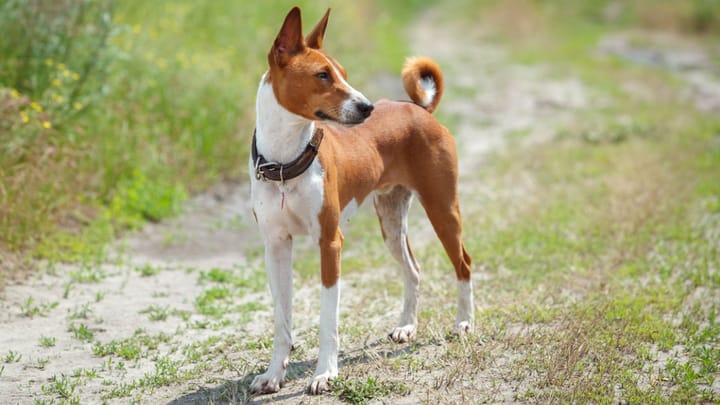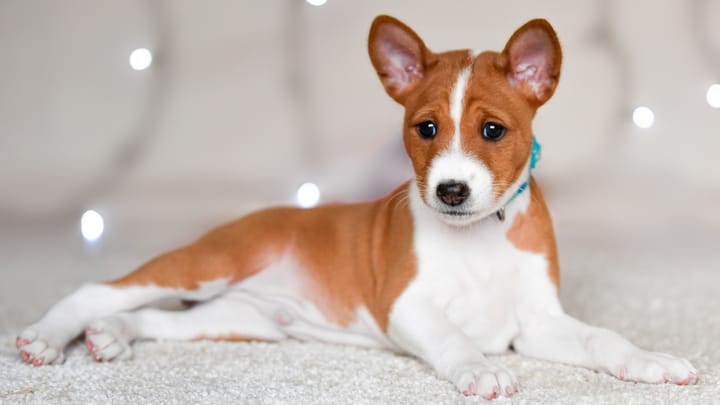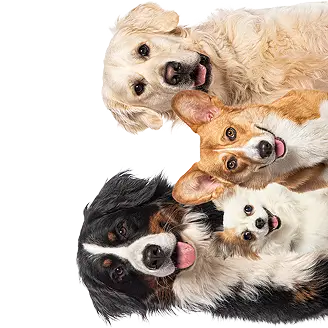Basenji
Other names : African Bush Dog, African Barkless Dog, Ango Angari, Congo Dog, Zande Dog, Congo Terrier


The Basenji is a medium-sized hunting dog. It was bred from other hunting and pariah dog in central Africa and remains quite rare in the west. The Basenji is a compact little dog with a playful and curious nature. Their most distinguishing characteristic is its unusual bark, which has been described as more of a yodelling sound. One theory is that the early African tribes selected against loud or persistent barkers, as the noise could give away their position to rival groups, especially at night. Despite not gaining much popularity in the UK, Basenjis make excellent family pets, although they can be a little difficult to train.
|
Life expectancy |
The Basenji has a life expectancy of between 13 and 15 years |
|
Temperament |
|
|
Size |
Small
|
|
Adult size |
Female
Between 15 and 17 in
Male
Between 16 and 18 in
|
|
Adult weight |
Female
Between 20 and 22 lb
Male
Between 22 and 26 lb
|
|
Coat colour
Light brown with white patches on the chest, legs, and hind quarters. Black/brown/white tricoloured. Some Basenjis have a reddish tint to their coats. |
Black Red White |
|
Type of coat
The Basenji's hair is short and very easy to maintain. |
Short |
|
Eye colour
Their eyes are dark. |
Brown
|
|
Purchase price |
The Basenji costs between £790 and £965 |
Although they’re very social animals, Basenjis tend to form an exceptionally strong bond with one member of their human family.
Like many intelligent dogs, the Basenji has a low tolerance for bored, which can soon turn into frustration.
It can be quite hard to find a well bred Basenji, especially in the UK. Take extra care and do as much research as possible before purchasing one of these dogs. A poorly bred Basenji is likely to develop serious health complications. These will be expensive to treat and extremely distressing for both dog and owner.
Females only go into season once a year. This is normally around the beginning of autumn.
The Basenji is known by many other names in its native Congo, including dog of the villagers, the wild dog, dog of the bush, and M'bwa M'kube M'bwawamwitu, which literally translates as the jumping up and down dog.
More details about the Basenji
Basenji: Origins and history
George Schweinfurth was first westerner to come into contact with the Basenji. He was researching the Niam Niam tribe in central Congo, who used packs of Basenjis as hunting companions. Not only was he surprised by the breeds superior tracking abilities, but he also made a note of their unusual bark, which the locals described as a “baroo” noise. The Basenji shares many of the same characteristics as Pariah dogs, half-feral pack dogs that survive on the outskirts of human settlements in developing countries. Basenjis are nowhere near as domesticated as most other breeds. In fact, these dogs are a real link between our modern household pets and their wild ancestors. Several attempts were made to introduce the breed into Britain and the Western world. However, given the long distances in transporting them and their unfamiliarity with the British climate, the first batches of Basenjis suffered several health problems and failed to develop. It wasn't until the 1930s that a foundation stock was established in the UK, from which their numbers and popularity began to grow. This culminated in 2001 when a Basenji named Jethard was named best in show at crufts.
Physical characteristics of the Basenji
The Basenji is a unique looking dog. It’s medium-sized canine with a combination of big and small dog characteristics. Their heads are quite small in relation to the rest of their body, which is sturdy, athletic, and well balanced. They have long necks, a high head carriage, and pointy ears, which gives them an alert posture and quizzical posture.
FCI classification of the Basenji
-
Group 5 - Spitz and primitive types
-
Section 6 : Primitive type
Basenji: Characteristics
Basenji: Behaviour
Training a Basenji
This depends on the ability and knowledge of the trainer. An inexperienced handler will have a very tough time keeping this dog focused. According to the author of the Intelligence of Dogs, the Basenji is the second most difficult dog to train.
Basenji: Lifestyle
Breed compatibility Basenji
Basenji: Purchase price
The average cost of a purebred Great Basenji is somewhere between £790-£965.
You'll also need to budget around £60 a month for feeding costs; the average cost of a basic insurance policy is around £20.00 per month.
Basenji: Shedding
Light
This dog doesn't shed too much.
Basenji: Grooming
When it comes to grooming, the Basenji is a very low maintenance breed. Their short coats shed very little and require no more than a quick brush once every few weeks. Unlike most dogs, Basenjis clean themselves regularly, which helps keep their coat healthy and fresh looking.
Basenji: Health
The average lifespan for these dogs is between 13-15 years.
The Basenji is a tough dog with a sturdy frame and determined nature. Both physically and mentally strong, the Basenji is a formidable little character.
These dogs work in some of the hottest environments on the planet. There’s almost zero chance of them struggling with the average British summer time.
The Basenji has a short coat and wasn’t designed for the cold weather. In fact, these guys are made for it’s very opposite. They’ll definitely need a good quality doggy coat during winter time walks.
They’re not prone to obesity or weight gain.
- Fanconi Syndrome
- Hip Dysplasia
- Persistent pupillary membrane
- Urolithiasis
- Autoimmune issues
- Progressive retinal atrophy (PRA)
- Dermatitis
- Bladder infections








